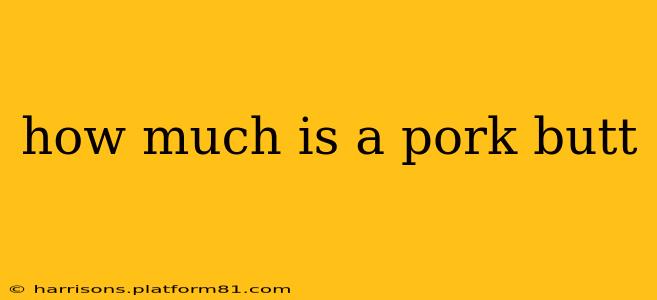How Much is a Pork Butt? Decoding the Cost of a Delicious Roast
The price of a pork butt, also known as a pork shoulder, varies significantly depending on several factors. There's no single answer to "how much is a pork butt?", but understanding these influencing factors will help you budget effectively for your next delicious pulled pork recipe.
What Factors Determine the Price of a Pork Butt?
Several key factors impact the final cost of a pork butt at your local grocery store or butcher shop:
-
Location: Prices fluctuate regionally. Rural areas may offer lower prices than urban centers due to differences in transportation costs and market competition. Coastal areas, for instance, might see higher prices due to transportation costs and potential import fees.
-
Store Type: Discount grocery stores typically offer lower prices than specialty butchers or upscale supermarkets. Butchers often offer higher-quality cuts at a premium price, reflecting their expertise and sourcing.
-
Weight: The price is usually calculated per pound. Larger pork butts generally cost less per pound than smaller ones, offering better value for larger gatherings or if you plan on freezing portions.
-
Seasonality: Pork prices can fluctuate slightly throughout the year, with potential increases during peak holiday seasons.
-
Demand: Increased demand, such as during the barbecue season, can temporarily drive up prices.
How Much Can I Expect to Pay?
While it’s impossible to give an exact price, you can generally expect to pay anywhere from $2 to $5 per pound for a pork butt. This broad range reflects the variations mentioned above. A 5-pound pork butt, for example, could cost between $10 and $25, depending on your location and where you purchase it.
Where Can I Find the Best Deals on Pork Butts?
-
Grocery Store Sales: Check weekly flyers for sales and discounts at your local grocery stores. Many stores run promotions on pork products, especially during certain times of the year.
-
Bulk Buying: Consider purchasing a larger pork butt if you plan to freeze portions for later use. The per-pound price is usually lower for larger cuts.
-
Local Butchers: While often slightly more expensive, local butchers may offer higher-quality pork butts and personalized service, allowing you to discuss your specific needs and preferences.
-
Farmers Markets: Depending on your location, farmers markets can be a good source for high-quality, locally sourced pork at competitive prices.
What About Bone-In vs. Boneless Pork Butts?
Bone-in pork butts tend to be slightly cheaper per pound than boneless options. The bone adds flavor and moisture during cooking, but it also means you'll have less usable meat once it's cooked. Boneless pork butts are more convenient for some cooks but can be a little pricier.
How to Get the Most Out of Your Pork Butt Purchase?
Regardless of the price you pay, maximizing the yield and flavor of your pork butt is crucial. Proper cooking methods, such as slow cooking or smoking, are essential for achieving tender, flavorful pulled pork. Careful planning and preparation will ensure your pork butt purchase is a culinary success, regardless of its initial cost.
